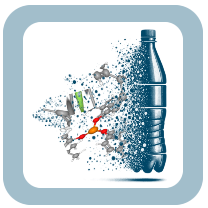Evidence on plastics and associated chemicals show previously invisible and unrecognized harms to human health - Children are especially vulnerable.
Global Plastic Production
Plastic production is increasing dramatically— projected to double by 2040 and triple by 2060, with the largest rise in single-use items like bags, straws, and plastic utensils.
Learn MoreMicro- and Nanoplastics
Tiny plastic particles enter the body through food, water, and air. Found in major organs, they have been reported to increase risks of heart attacks and strokes.
Learn MoreChemicals in Plastics
Plastics contain over 16,000 chemicals, many untested. They include chemicals known to cause cancer, brain damage, and fertility loss. Most people carry these in their bodies.
Read article in Nature (journal)State of Science on Plastic Chemicals
UN Global Plastic Treaty
On March 2, 2022, the United Nations pledged to develop a global plastics treaty that will address the entire life cycle of plastics. The Treaty aims to cap production, ban single-use plastics, and mandate toxicity testing.
Learn MoreMinderoo-Monaco Commission on Plastics and Human Health
A comprehensive analysis of plastics' impacts on human health across its life cycle
Learn MoreProtect your family
Avoid heating plastics, use glass or stainless steel, buy BPA/ phthalate-free items, and choose fresh over processed foods.
Minimize Plastic AdditivesTips for families and Caregivers






